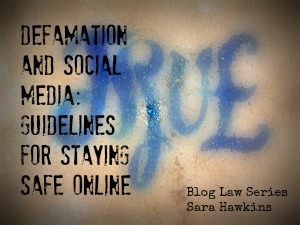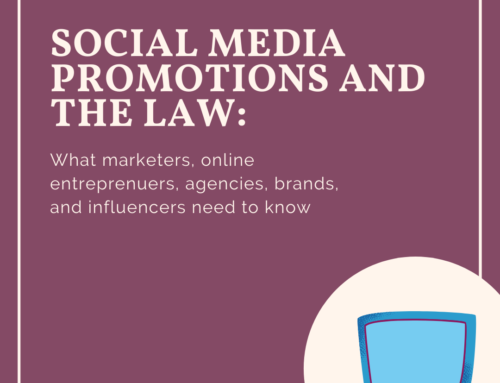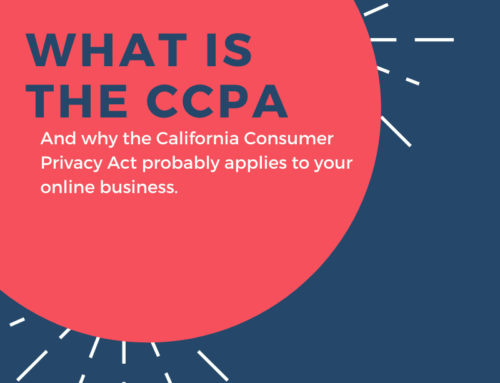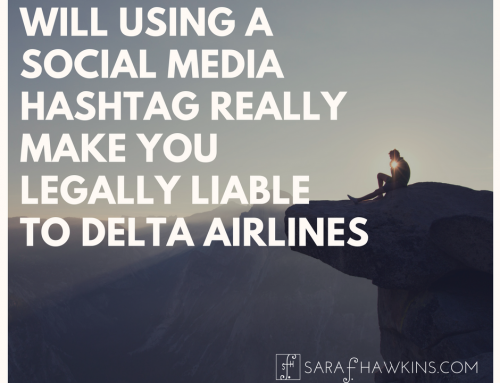
We’ve all heard the phrase “If you can’t say something nice, don’t say anything.” When it comes to social media and online content, though, its seems the phrase is actually “If you can’t say something nice, blog, tweet, facebook, or post it online.” While I shouldn’t be, I am surprised at what people post online. It’s as if there is no internal filter on some people. For others, Shakespeare has nothing on the drama they call life. Defamation has been around for ages and now social media is giving it a new platform. Social media defamation is definitely on the rise and no longer being ignored.
While it may not seem like many, as early as 2007 several hundred bloggers have been sued on a variety of legal theories, with defamation topping that list. And, as recent as 2011 a blogger was held liable for defamation and assessed $2.5 million in damages. Legal liability for what you post (and even comments made) on your blog is not a theoretical discussion. It is very real and is happening more often than you may imagine.
What is Defamation?
Defamation covers two types of communication, written (libel) and spoken (slander). Generally, defamation is a statement that is communicated to a third party and makes a claim, either expressly or implied to be factual, that injures another’s reputation or causes others not to associate with the person or business. Malicious intent is not generally required. And given that few bloggers would likely be classified as Public Figures within the very narrow definition, don’t rely on the “but they have to prove malice” defense.
With blogging, the main concern will be libel. Even if it’s not a written blog post but rather a vlog or podcast or some other type of internet-oriented medium, you’re likely going to be dealing with libel.
How does this apply to bloggers?
Your Own Statements
While 40 states do have Media Shield Laws which protect members of the media and media organizations, not all of those states include the internet in their Shield laws. As such, bloggers are not able to use those same protections when they write negative things about other people or organizations when those statements are implied to be or stated as factual when in-fact they are not.
We’re not talking about bloggers giving a review and sharing their opinion and their personal experiences which happen to be negative. Truth is always a defense to a defamation claim, but you have to have some proof that what you state is, in fact, true.
In addition, one of the key words in the definition requires that the statement be asserted as fact. This is why many bloggers and users of online forums, chats, and social networks and platforms are very clear to assert that their statements are merely their opinion.
For most bloggers, when it comes to their blog the risks of defamation are low. The topics covered don’t generally lend themselves to the assertion of allegedly false statements of fact nor do the comments and discussions move in that direction. However, with the US legal system as easy to use as it is there is a real possibility of being sued. Because being sued isn’t the same as being held responsible, someone can sue you just because they have a good faith belief that you’re defaming them. (Just ask Donald Trump.)
Comments On Your Blog
One of the great things about blogging is connecting with our readers. Engagement and comments are what we live for. In general, bloggers keep an eye on the comments. We need to filter out the junk, make sure people aren’t taking advantage of our generosity with the link juice, and try to keep the haters at bay. Some people moderate all their comments so they can control what goes out publicly on their blog. Others feel that moderation impedes conversation so they allow anyone to comment and it be available in real time.
Are bloggers really responsible for what a commenter says on their blog? As a lawyer, the answer is a resounding … MAYBE! In general, we’re not responsible for libelous statements made by others. So much so that Section 230 of the Communications Decency Act (47 USC 230) offers protections that apply to bloggers who permit comments on their sites. However, this won’t prevent someone from filing a suit against you or subpoenaing you and/or your blog records, but it will be an affirmative defense you can raise. And while you may not be liable, having to spend your time and money being involved in a lawsuit are often very high costs to standing your ground.
Where Can You Be Sued?
I’ve been asked this a few times. And while the answer is somewhat complicated, at the same time it’s very easy. The short answer is Everywhere! It is the world wide web, after all. And that first word, world, is quite broad. Chances are though, that if you were sued for defamation you’d likely be sued in the US in some state other than where you live. And that creates lots of problems.
Jurisdiction, the ability of a court to hear a case involving you and your actions, can be pretty tricky. For example, criminal courts can only hear cases about alleged violations of criminal laws. It can’t rule on divorce or probate or contract disputes. Civil courts, though, hear cases about civil matters. That’s called subject-matter jurisdiction.
With any court, though, they also have to have authority to hear a case involving you specifically. Known as personal jurisdiction, the state has to have some relationship to the parties or the matter to haul you into their system. You can’t just file a lawsuit against someone anywhere in the US. The parties involved have to have some relationship with the state to be subject to their court system. Even in Federal Court, the courts have special rules about which court you can use.
If you blog in California and the person or company that alleges you have defamed them is in Florida, where do they sue? Besides looking at the question of state or federal court (which I won’t discuss), should you have to go to Florida because it’s convenient for them? Why shouldn’t they sue you in California? After all, you are there and that’s where the alleged defamation occurred. Right?
As recently as 2010, a Washington State blogger was sued in Florida for defamation. The Washington blogger didn’t think she should have to go to Florida to defend herself because she had nothing to do with the state. Unfortunately, the court disagreed. The rule that came out of that case is that if your posts are accessible in Florida then you’re subject to Florida courts.
That’s not a US Supreme Court ruling and therefore not the ultimate law of the land. However, as precedent it is very strong. As such, just understand that even if you’re sitting in your jammies in middle of nowhere USA you may need to haul yourself into any court in the land to defend yourself for claims relating to your blog.
Comments, Discussions and Updates Made to Social Networks or Platforms
You may have heard that rocker (and wife to the late Curt Cobain) Courtney Love was sued over an allegedly defamatory tweet. In less than 140 characters, Ms. Love made allegations against a former clothing designer she had been working with. And while the case never went to trial so we won’t know if there is any legal basis, Ms. Love settled the defamation suit. However, Ms. Love didn’t think she needed any type of internal filter when using Twitter after that experience and later in that same year she was sued again for defamation, this time by her former lawyer.
While most people aren’t using Twitter or other social platforms to make allegedly defamatory statements, the increase in what are believed to be private discussions within social media and social networks are beginning to pose concerns. A defamatory statement does not require publication to any specific number of people. In fact, all that is required is that such a statement is made to a third-party. One person! A defamatory statement sent by Direct Message on Twitter, the chat feature in Facebook, instant message or even text is all that’s needed. You may wonder how the person/company/business being defamed would learn about it, but really do you.
7 Important Takeaways about Defamation (specifically, Libel)
1. You only have to publish your statement to ONE person! – Contrary to what many believe, you don’t need to tell millions of people to be held liable for defamation. With the ease of screen capping or forwarding a text, what you say to one person can easily get to the allegedly defamed person. As for those private conversations on DM, IM, chat or text, they’re fair game. As is anything said in those “secret groups” on various social media platforms.
2. You can likely be sued anywhere in the US – Anything published on the interest will likely expose you to jurisdiction in courts across the country. Be prepared. Even if what you did say turns out not to be defamatory, it doesn’t prevent you from being hauled in to court in another state to prove it.
3. You may be sued for what other people say on your blog – As a blog administrator, you have a great deal of control over comments made on your blog. And while Section 230 of the Communications Decency Act may protect your from liability, it won’t protect you from being sued and having to defend yourself. Sure you’ll be able to raise a valid defense but you’re still being sued and it sucks.
4. What you write is asserted as fact either expressly or impliedly – Defamation does not apply when the statements are your own opinion. It’s when asserting things as fact that you can get in to trouble. When ranting about someone (or something, or a company) and it’s just your opinion then make sure it’s clear that it’s your opinion. If you’re stating facts be clear about that as well. Knowing for a fact so-and-so was smoking weed, make sure you can back it up with either first hand knowledge or a reliable source then write about it. But if you just think so-and-so is a pothead don’t risk it with hyperbole and grandstanding. But remember you can’t shield your source and expect the court to just wave you past go to collect your $200.
5. Bloggers often aren’t treated the same as traditional media – Even for those bloggers who take a more journalistic approach to their craft, many courts still aren’t ready to extend traditional media protections to a blogger. While some states have attempted to close this gap on how bloggers are classified, most have not. But, like traditional media, bloggers should check, double-check, and possibly triple-check any sources they rely on for their information.
6. Be careful with photos and images you use – The saying that a picture is worth a thousand words can be a detriment to you if you use a photo that implies a fact that is untrue. Stay away from juxtaposing images with stories to imply something that isn’t there.
7. If you are sued, find a lawyer in your city that specializes in defamation – Removing the post or deleting the content may not be the best thing to do. You can’t unring the bell, but you can find out how to best defend yourself. If not handled appropriately, removing the allegedly offending information can make the problem bigger.
While I mention this in the context of a blogger, really it’s applicable to any type of online professional or entrepreneur that publishes content on the web. While the adage is that “if you can’t say something nice, don’t say anything at all”, we need honesty and authenticity. Others may not like what you have to say about them or their product, but the truth of the matter is that we’re all allowed our opinion and the ability to tell the truth.
Disclosure: While I am a lawyer, I am not offering legal advice. Posts on legal matters are intended to provide legal information and do not create an attorney/client relationship.






Its so easy to blame anybody, but its not a good side of human being. I like the phrase “if you can’t say something nice, don’t say anything at all”. So, we should become broad minded and truthful while blogging.
This is kind of scary really… :/
[…] Defamation and Social Media […]
[…] highly recommend this article by attorney Sara Hawkins on Defamation and Social Media. Please read and keep it in your blog toolkit. It’s valuable […]
This is scary indeed!
Really great and informative – thanks so much for sharing this!
Some great information here to help”protect” ourselves as we blog. Thanks for sharing.
We should all bookmark this as a reminder every now and again, lest we forget and open ourselves up for serious problems.
Thank you for this informative post. I really had no idea I needed to concern myself with the comments left on my blog as well.
Great post, Sara. I am tweeting it so other bloggers can read it too. I appreciate all the hard work you put into writing it!
This is some really important information to keep in mind for anyone who writes a blog or who comments on blogs. A good friend of mine runs a social justice blog, and when she told me that because she is Canadian and Canada has hate speech laws, that if someone were to comment on her blog using hate speech, she could be sued. That was surprising to me because I had never heard of it before, and I didn’t think it applied to people living in the U.S. After some research, I found that while hate speech laws don’t necessarily apply to blogs and the people who run them in the U.S., due to our inclination to wave our free speech flags whenever our words could potentially get us into trouble, defamation and libel are slippery slopes to get into. Thanks for sharing this!
Very interesting read! Thank you for posting this!! It’s funny too, because in today’s post about what not to wear to work, I was going to relate some funny stories regarding wardrobe faux pas in the workplace… things I’d seen or heard from others. I opted to remove that part of my entry in case it got back to someone and, even with name changes, caused problems (either for them, or me!). I could certainly get my point across without the stories, I decided… and better safe than sorry!
Wow, what an insightful read. Thank You.
Gladys P (Mom To Grandma)
[…] but it’s not something we all know enough about. These 12 most useful things to know about social media and defamation are the first steps to empowering ourselves, our friends and our […]
Great article Sara! Glad you touched upon jurisdiction here. You know, there are online samples that have a particular state statute mentioned… I’ve seen people think this is the way to go and don’t modify the templates or follow the proper protocol when writing cease and desist letters, etc. It’s important when using samples to edit it properly. And when receiving these types of letters, it’s important to defend yourself.
As always, love your blog law series.
Another reason why I keep my posts positive
[…] https://sarafhawkins.com/blog-law-defamation-and-social-media/ […]
I have an ex fiance from oregon that plan to suit me im from canada for difamation of caractere..cause i found out he had an online affair with this woman ..and text her personnally on meetme site…to tell her the fact between me and him….he then find out cause he saw i registered back on this online site…then block me…then went private….instead to talk about it…he got cut…he text me on my phone saying he is suying me..for difamation …should i worry??…or i have cause to counter suit him?
Lorraine, you need to consult with a legal professional near you to determine the best way to handle this matter. Best of luck, Sara
Thanks for an informative post!
This is very useful – thanks for sharing this article
Have any of these laws changed since this article was written? I was sent unsolicited private messages on a fb blog from the ex wife of a physician dissuading me to see him and one other physician. Aludimg to then being bad physicians. What are my recourses? The intent was malicious.
There have been no major changes to defamation law since this article was written. If you are the recipient of information about a 3rd party, not sure what recourse you have since you are not the subject of the messages. You may want to speak with an attorney knowledgable in this area if you are concerned.
hi dear sara
can I sue a person who is living in America but she posted a lot of bad statement against my marriage and me personaly using my matrimonial photos . if so how and where. thank you am awaits your private reply regards rolina
Non-US citizens may be able to sue US citizens/residents in a host of jurisdictions. You should speak to an attorney in your area to determine the best course of action.